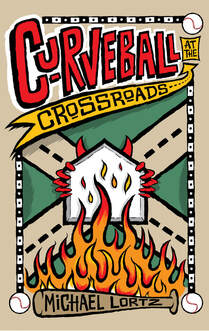
Making wagers or deals with the devil goes back to the Book of Job in the Old Testament, when God and Satan make a bet, with the virtuous soul of Job hanging in the balance.
In baseball literature, the benchmark is Douglass Wallop’s 1954 classic, The Year the Yankees Lost the Pennant — published, ironically, in a year the Yankees did lose the pennant because the Cleveland Indians won a then-American League record 111 games. That book was later repackaged for stage and film as “Damn Yankees.”
I saw a stage version of “Damn Yankees” years ago in Tampa, with Jerry Lewis playing the role of the devil (Applegate). He was pretty good, too.
Tampa-based writer Michael Lortz draws from all of these examples to produce a new twist to an old story, with a little bit of Sidd Finch thrown in for good measure, in his first novel, Curveball at the Crossroads (Paperback, second edition; $9.20 on Amazon Prime; Legacy Book Publishing; 269 pages).
The cover for the second edition of this self-published novel is much better than the first. Flashier and more intriguing — just like Lortz’s premise.
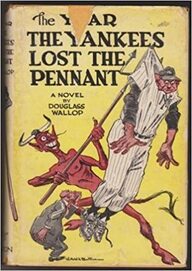
Some will recall the reference to the Talking Heads song, “Papa Legba,” or the character of the same name played by “Mod Squad” alumnus Clarence Williams III in an episode of “Miami Vice.”
Regardless, opposing hitters were having a hell of a time with JaMark — until he shatters his shoulder in the final inning of his final high school game for the Rosedale Eagles.
Lortz has a fast-paced narrative aided by 66 short chapters — a subtle, devilish twist for numerologists. The book blossomed from a five-page short story Lortz wrote in 2012. The beginning and ending are the same — but in this expanded version, the devil is in the details.
Unlike Wallop’s character, JaMark does not take on a new identity, changing from Joe Boyd to Joe Hardy. And unlike the disgruntled Joe Boyd, JaMark hits rock bottom in life, abandoned by all of his family except his ne’er-do-well Uncle Rufus and his saintly grandmother.
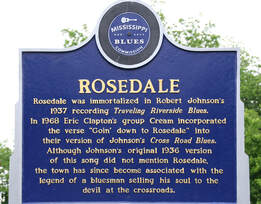
Looks like Grandma was prescient.
The book gets its name from a crossroads outside Rosedale, which is a tribute to the real-life Devil’s Crossroads in Clarksdale, Mississippi. That is where, according to folklore, legendary blues singer and guitarist Robert Johnson made a deal with the devil so he could “play a mean guitar.”
JaMark is snoozing near the base of an old tree when the moonshine bottle and cigarette he tosses to a nearby intersection catches fire. But it’s a weird fire, and a strange man, well-dressed in a black top hat, suit and tie emerges from the controlled blaze.
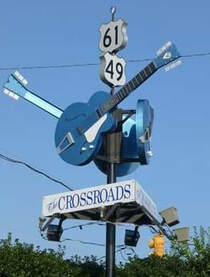 The Crossroads in Clarksdale, Mississippi.
The Crossroads in Clarksdale, Mississippi.
But …
They make a deal and here is the caveat: “Always put me first,” the devil says.
Do that, he says, and JaMark’s arm will never hurt again. Failure to do so will result in the devil taking it all away — including his soul.
Lortz received his bachelor’s degree in creative writing from Florida State University, and he weaves an intriguing tale that begins to separate itself from the Joe Hardy tale.
Plus, Lortz comes up with some good lines. My favorite was that JaMark's mother "ran away with a freelance writer who wrote run-on sentences."
Without giving away the plot, it is apparent that Curveball is a classic tug of war between good and evil. Most of his baseball peers are stunned by his meteoric rise in the minor leagues, but at least one old coach had seen this tale before.
JaMark is unnerved at a bingo hall when introduced to an elderly woman who exclaims that the ballplayer has the devil in him.
And of course there is the devil himself, who periodically shows up to express displeasure at not being put first.
JaMark does have a creative way of getting around crediting the evil guy, telling reporters that “the devil is in the details.”
How true.
JaMark makes it to the majors and plays for the St. Petersburg Saints — the name is a nod to the longtime minor league franchise in the west-central Florida city that existed before the Devil Rays (now the Rays) joined MLB in 1998.
He has a memorable first full season, eerily similar to those of fellow left-hander Vida Blue in 1971 and Dwight Gooden in 1984.
But in the devil’s view, JaMark giving credit to everyone but him in a filmed commercial for Colonel Crispy cereal (must be Captain Crunch’s older brother) is the last straw.
The petulant devil eventually takes away JaMark’s abilities, but offers him one last chance to save his soul.
And that’s when the drama builds.
There is Dusty Polichardo, who was a great pitcher during the 1950s but suddenly lost his touch. Now, as a coach, he seems to creep out JaMark more than offer advice, but he will play a crucial role when it counts. In an interview, Lortz has said that the character was influenced by Fernando Valenzuela (remember Fernando-mania in the strike-shortened 1981 season?) and Tom Lasorda.
And finally, Inga Roosevelli, a mysterious woman who runs a restaurant in the middle of nowhere with a clientele that resembles the bar patrons in the “The Shining” with their seemingly sinister silence. She also will play a role in the finale, having an odd exchange with the devil that may portend what is to come years later.
On his website, Lortz notes that there are several hints and references to blues legends, songs by Jimi Hendrix and Snoop Dogg, food preferences of Elvis Presley (peanut butter, banana and bacon) and Elwood Blues (dry white toast), and a nod toward pro wrestling’s Iron Sheik, among others.
The only glitch I saw was the incorrect spelling of "Volkswagen" in Chapter 61.
Lortz’s novel is heavily influenced by the blues — JaMark’s birthday (May 8) is the same date as Johnson’s, for example.
But above all, pay attention to Lortz’s narrative. Some of JaMark’s feats are simply unfathomable, but Lortz pulls it all together in a crisp, believable story. There are several currents flowing in this book, but they inevitably swirl around JaMark.
Spoiler alert, sort of: the final chapter, like several in the book, are presented in a play-by-play announcer’s patter. The final sentences will really get you thinking.
I have a theory, but I will keep it to myself. Even if I am wrong, I am correct in saying that Curveball at the Crossroads was a fine debut.
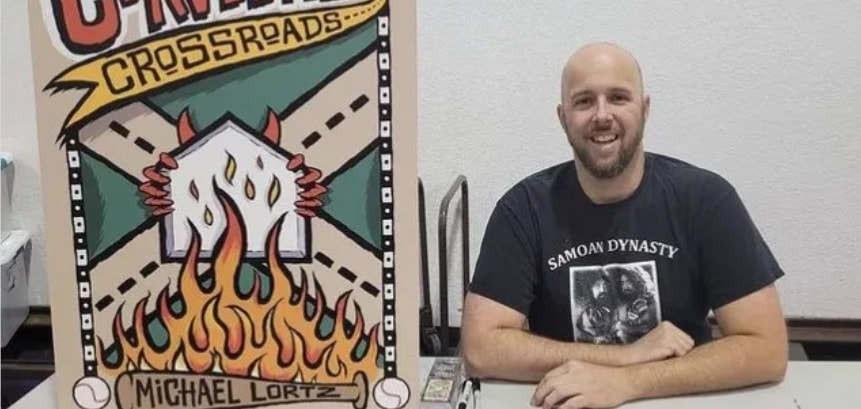
 RSS Feed
RSS Feed
